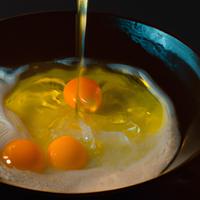
1 serving (15 grams) contains 25 calories, 2.0 grams of protein, 1.8 grams of fat, and 0.2 grams of carbohydrates.

Log this food in SnapCalorie

Nutrition Information
Calories |
394.3 | ||
|---|---|---|---|
% Daily Value* |
|||
| Total Fat | 28.4 g | 36% | |
| Saturated Fat | 9.5 g | 47% | |
| Polyunsaturated Fat | 0 g | ||
| Cholesterol | 867.5 mg | 289% | |
| Sodium | 394.3 mg | 17% | |
| Total Carbohydrates | 3.2 g | 1% | |
| Dietary Fiber | 0 g | 0% | |
| Sugars | 1.6 g | ||
| protein | 31.5 g | 63% | |
| Vitamin D | 157.7 mcg | 788% | |
| Calcium | 78.9 mg | 6% | |
| Iron | 3.2 mg | 17% | |
| Potassium | 236.6 mg | 5% | |
* Percent Daily Values are based on a 2,000 calorie diet. Your daily values may be higher or lower depending on your calorie needs.
Food Attributes
Source of Calories
About Egg wash
Egg wash is a mixture made by whisking raw eggs, sometimes with added water, milk, or cream, depending on the recipe. Commonly used in baking and cooking, it has origins in European cuisine, where it enhances the appearance and texture of pastries, bread, and pie crusts by giving them a glossy, golden finish when baked. While egg wash contributes minimal nutritional value, the eggs provide small amounts of protein, vitamins, and minerals. Variations with cream or milk add fat content, which should be considered for dietary needs. Egg wash is typically used in small quantities, so its impact on calorie intake is negligible for most recipes. However, individuals with egg allergies or dietary restrictions should avoid it or seek alternative options like plant-based washes. As a versatile culinary tool, egg wash elevates both presentation and quality without substantially altering a dish's nutritional profile.



